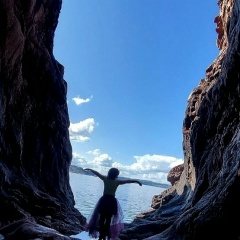В Баку все через край, вино в ресторанах наливают без мерного стакана, а на поверхности воды в бухте переливается нефтяная пленка. Уже второй раз в своей истории город переживает нефтяной бум. Как и в начале прошлого века это сопровождается бурным ростом строительства и притоком европейцев. Советский период в истории Азербайджана воспринимается крайне негативно, особенно имя Сталина, который начинал свою революционную деятельность именно в Баку под предлогом борьбы за права рабочих, эксплуатируемых нефтяными королями того времени - Нобелями, Ротшильдами. Деятельность его организации была основана на грабежах и похищениях, здесь впервые Сталин был посажен в тюрьму.
Архитектура современного Баку чрезвычайно разнообразна, на фоне стен 12 века возвышаются небоскребы из металла и стекла, центр города застроен красивыми особняками начала 20 века, песчаный цвет и восточная помпезность деревянных, металлических деталей прекрасно подходят для бутиков luxury брендов, которые расположились на первых этажах многих домов. Но далеко не везде красивая наружность соответствует богатому наполнению, дворы некоторых домов, сколоченные из подручных материалов, поражают убогостью, за ярким фасадом сушится застиранное белье.
Зато подземные переходы, ведущие к много километровой образцовой набережной, сделаны из мрамора и освещены шикарными люстрами.
Нефтяные качалки работают на фоне жилых домов, а с пляжа 5-звездного отеля открывается незабываемый вид на работающие платформы, которые особенно красиво горят ночью.
Благодаря красивым паркам на холмах у моря и пестрящему отражению небоскребов в воде - Баку очень романтичный город и здесь немного грустно быть одному, в командировке. По примеру Эмиратов идет строительство острова в море, местные жители с воодушевлением рассказывают про объявленные проекты, судя по всему будет очень интересно вернуться лет через пять.
Архитектура современного Баку чрезвычайно разнообразна, на фоне стен 12 века возвышаются небоскребы из металла и стекла, центр города застроен красивыми особняками начала 20 века, песчаный цвет и восточная помпезность деревянных, металлических деталей прекрасно подходят для бутиков luxury брендов, которые расположились на первых этажах многих домов. Но далеко не везде красивая наружность соответствует богатому наполнению, дворы некоторых домов, сколоченные из подручных материалов, поражают убогостью, за ярким фасадом сушится застиранное белье.
Зато подземные переходы, ведущие к много километровой образцовой набережной, сделаны из мрамора и освещены шикарными люстрами.
Нефтяные качалки работают на фоне жилых домов, а с пляжа 5-звездного отеля открывается незабываемый вид на работающие платформы, которые особенно красиво горят ночью.
Благодаря красивым паркам на холмах у моря и пестрящему отражению небоскребов в воде - Баку очень романтичный город и здесь немного грустно быть одному, в командировке. По примеру Эмиратов идет строительство острова в море, местные жители с воодушевлением рассказывают про объявленные проекты, судя по всему будет очень интересно вернуться лет через пять.
In Baku, everything is over the edge, wine is poured in restaurants without a measuring glass, and an oil film shimmers on the surface of the water in the bay. For the second time in its history, the city is experiencing an oil boom. As at the beginning of the last century, this is accompanied by the rapid growth of construction and the influx of Europeans. The Soviet period in the history of Azerbaijan is perceived extremely negatively, especially the name of Stalin, who began his revolutionary activity in Baku on the pretext of fighting for the rights of workers exploited by the oil kings of that time - the Nobels, the Rothschilds. The activities of his organization were based on robberies and abductions, here for the first time Stalin was imprisoned.
The architecture of modern Baku is extremely diverse, skyscrapers of metal and glass rise against the backdrop of the 12th century walls, the city center is built up with beautiful mansions of the early 20th century, the sand color and oriental pomp of wooden and metal details are perfect for luxury boutiques of brands that are located on the first floors of many houses . But far from everywhere, a beautiful appearance corresponds to rich filling, the courtyards of some houses, knitted from improvised materials, amazes with wretchedness, washed laundry is dried out behind a bright facade.
But the underground passages leading to the many-kilometer model embankment are made of marble and illuminated by chic chandeliers.
Oil pumping works against the background of residential buildings, and from the beach of the 5-star hotel offers an unforgettable view of the working platforms, which are especially beautiful at night.
Thanks to the beautiful parks on the hills by the sea and the colorful reflection of skyscrapers in the water, Baku is a very romantic city and it is a little sad to be alone on a business trip. Following the example of the Emirates, the construction of the island in the sea is underway, local residents enthusiastically talk about the announced projects, apparently it will be very interesting to return in five years.
The architecture of modern Baku is extremely diverse, skyscrapers of metal and glass rise against the backdrop of the 12th century walls, the city center is built up with beautiful mansions of the early 20th century, the sand color and oriental pomp of wooden and metal details are perfect for luxury boutiques of brands that are located on the first floors of many houses . But far from everywhere, a beautiful appearance corresponds to rich filling, the courtyards of some houses, knitted from improvised materials, amazes with wretchedness, washed laundry is dried out behind a bright facade.
But the underground passages leading to the many-kilometer model embankment are made of marble and illuminated by chic chandeliers.
Oil pumping works against the background of residential buildings, and from the beach of the 5-star hotel offers an unforgettable view of the working platforms, which are especially beautiful at night.
Thanks to the beautiful parks on the hills by the sea and the colorful reflection of skyscrapers in the water, Baku is a very romantic city and it is a little sad to be alone on a business trip. Following the example of the Emirates, the construction of the island in the sea is underway, local residents enthusiastically talk about the announced projects, apparently it will be very interesting to return in five years.








У записи 13 лайков,
0 репостов.
0 репостов.
Эту запись оставил(а) на своей стене Станислав Гольдфельд
































